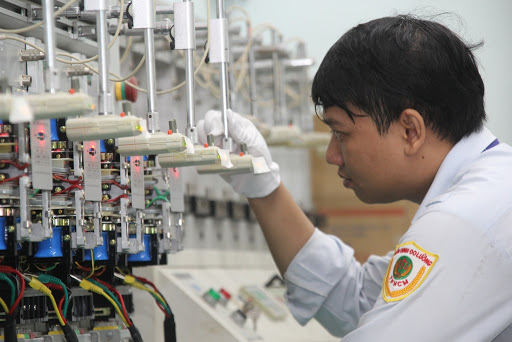Minimum Skill Requirements for the Electrical Measurement Discipline at the College Level
From February 10, 2019, Circular 48/2018/TT-BLDTBXH issued by the Ministry of Labor, Invalids and Social Affairs (MOLISA) stipulating the minimum knowledge volume and competency requirements that learners must achieve after graduating from intermediate-level and college-level programs in electrical, electronics, and telecommunications engineering will take effect.

Minimum Skill Requirements for Electric Measuring Major at College Level - Illustration
As stipulated in the Regulations on minimum knowledge volume, competency requirements that learners must achieve upon graduation from the intermediate level, college level in the electric measuring major, issued along with Circular 48/2018/TT-BLDTBXH, the minimum skill requirements that learners must achieve upon graduation from the electric measuring major at the college level are as follows:
- Prepare tools, equipment, materials according to the plan for organizing the installation of measuring tools and electric measuring systems;
- Utilize electric circuit drawing software to verify the electric circuit system;
- Proficiently record installation logs and operation logs;
- Skillfully use welding or screwing equipment, connectors, bolts for making connections;
- Use continuity testing devices such as a multimeter, determine continuity results, contact resistance, and conclude whether they meet the standards or not;
- Use grounding resistance testing devices like a tereometer, compare and conclude whether they meet the standards or not;
- Use electric measuring devices: voltmeters, ammeters, single-phase and three-phase electric meters, etc.;
- Organize and implement occupational safety measures, industrial hygiene, and fire and explosion prevention during the installation of electric measuring systems;
- Install, inspect, maintain current transformers and voltage transformers;
- Operate measuring devices and systems correctly according to the procedures; handle abnormal conditions and incidents according to the procedures, ensuring safety;
- Check the correct types and quantities of equipment and materials; transport, preserve equipment, materials, accessories;
- Inspect, test, and preserve safety equipment and spare materials; identify and accurately assess the technical condition of spare materials;
- Proficiently check and replace fuse wires;
- Proficiently inspect and maintain voltage transformers and current transformers;
- Detect incidents (if any) and propose appropriate handling measures;
- Inspect, maintain, and repair high-voltage fuses, arrestors, lightning rods, grounding systems, high and low voltage electric cabinets and panels;
- Inspect, maintain, and repair electric measuring systems, control systems, relay protection, and automation in substations according to the level of training;
- Use basic information technology as required; exploit, process, and apply information technology in specialized work of the major;
- Use basic foreign language skills, achieving level 2/6 in the Vietnamese Foreign Language Proficiency Framework; apply foreign languages in specialized work of the major.
For details, see Circular 48/2018/TT-BLDTBXH, issued on December 28, 2018.
Le Vy
- Responsibilities of officials of the Ministry of Finance of Vietnam when they are issued Official Passports from November 19, 2024
- 06 solutions to enhance the effectiveness of social policy credit in the new phase in Vietnam
- Financial support level for the purchase and repair of transportation vehicles for the Economic - National Defense Corps in Vietnam from December 30, 2024
- Financial support levels for purchasing and repairing of medical equipment for the Economic - National Defense Corps in Vietnam from December 30, 2024
- Latest regulations on management and use of passports for officials and public employees of the Ministry of Finance of Vietnam
- New regulations on the procedures for veterinary sanitation inspection in Vietnam from January 6, 2025
-

- Responsibilities of officials of the Ministry ...
- 16:00, 23/11/2024
-

- 06 solutions to enhance the effectiveness of social ...
- 15:32, 23/11/2024
-

- Guidelines for registration and organization of ...
- 11:53, 23/11/2024
-

- Contents of audit service quality control in Vietnam
- 11:00, 23/11/2024
-

- Acts in violation of Law on Independent Audit ...
- 10:30, 23/11/2024
 Article table of contents
Article table of contents
